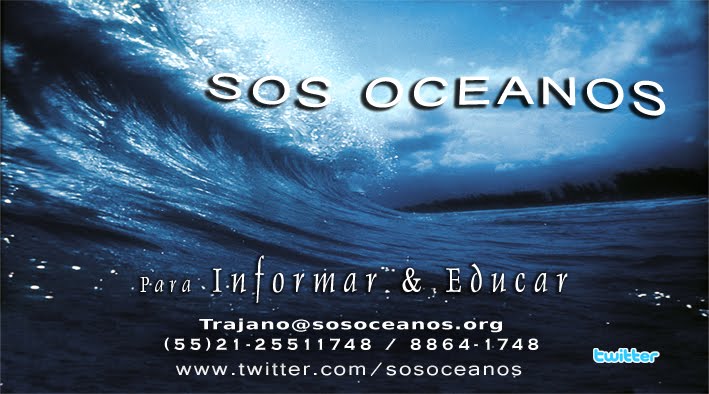
The objective of this blog is to post images and news, that are published at other websites, that are concerned about the conditions of our the world oceans. It is also an english version SOS OCEANOS.We also write and publish relevant information and photographs of our region whenever is necessary people to know.

sábado, 10 de dezembro de 2011
terça-feira, 6 de dezembro de 2011
segunda-feira, 5 de dezembro de 2011
Ancient Oceans Offer New Insight Into Origins Of Animal Life
http://www.sciencedaily.com/releases/2009/09/090909133020.htm
terça-feira, 8 de novembro de 2011
Sea life 'must swim faster to survive' to survive climate change
 |
In a new study, scientists warn that fish and other sea creatures will have to travel large distances to survive climate change. (Credit: © Mark Doherty / Fotolia)
|
http://www.sciencedaily.com/releases/2011/11/111107161959.htm
domingo, 23 de outubro de 2011
ScienceDaily (2011-10-21) -- Global warming is real, according to a major new study. Despite issues raised by climate change skeptics, the Berkeley Earth Surface Temperature study finds reliable evidence of a rise in the average world land temperature of approximately 1 degree Celsius since the mid-1950s.
quinta-feira, 6 de outubro de 2011
terça-feira, 20 de setembro de 2011
 |
| The ocean conveyor belt transports water -- and heat -- around the globe. (Credit: NOAA) |
ScienceDaily (2011-09-18) -- The planet's deep oceans at times may absorb enough heat to flatten the rate of global warming for periods of as long as a decade even in the midst of longer-term warming, according to a new analysis.
http://www.sciencedaily.com/releases/2011/09/110918144941.htm
domingo, 18 de setembro de 2011
Yesterday, Saturday september the 17th, we followed ( took photographs and video) the annual event, well organized by Instituto Aqualung, for cleaning up the beaches in Rio de Janeiro. Kids and their parents,families, worked together during several hours helping to remove the small sized garbage that we always find in our beaches, generally hidden under the sand.It was a complete success and had a participation of the local midia and hundreds of people.This event helps to create an awareness process within the youngsters towards taking actions to protect our fragile beach and shore ecosystems.
quinta-feira, 30 de junho de 2011
2010 One of Two Warmest Years On Record

ScienceDaily (June 29, 2011) — Worldwide, 2010 was one of the two warmest years on record, according to the 2010 State of the Climate report, which NOAA has just released. The peer-reviewed report, issued in coordination with the American Meteorological Society, was compiled by 368 scientists from 45 countries. It provides a detailed, yearly update on global climate indicators, notable climate events and other climate information from every continent.
http://www.sciencedaily.com/releases/2011/06/110629204702.htm
terça-feira, 14 de junho de 2011
segunda-feira, 30 de maio de 2011
Ocean acidification will likely reduce diversity, resiliency in coral reef ecosystems
http://www.sciencedaily.com/releases/2011/05/110529184043.htm
A new study from University of Miami (UM) Rosenstiel School of Marine & Atmospheric Science scientists Chris Langdon, Remy Okazaki and Nancy Muehllehner and colleagues from the Australian Institute of Marine Science and the Max-Planck Institute for Marine Microbiology in Germany concludes that ocean acidification, along with increased ocean temperatures, will likely severely reduce the diversity and resilience of coral reef ecosystems within this century.
domingo, 29 de maio de 2011
Significant role played by oceans in ancient global cooling
ScienceDaily (2011-05-28) -- Thirty-eight million years ago, tropical jungles thrived in what are now the cornfields of the American Midwest and furry marsupials wandered temperate forests in what is now the frozen Antarctic. A debate has long been raging in the scientific community on what changes in our global climate system led to such a major shift from the more tropical, greenhouse climate of the Eocene to the modern and much cooler climates of today. Researchers have now found some of the strongest evidence to date that the Antarctic Circumpolar Current (ACC) played a key role in the major shift in the global climate that began approximately 38 million years ago.
http://www.sciencedaily.com/releases/2011/05/110526141406.htm
segunda-feira, 16 de maio de 2011
The Excess of Industrial fishing is diminishing fish populations fast
 |
| Bluefin tuna - credit NOAA |
quinta-feira, 12 de maio de 2011
Can clouds help mitigate global warming? Missing links found in biology of cloud formation over oceans
http://www.sciencedaily.com/releases/2011/05/110511134209.htm
A formação de nuvens sobre os oceanos tem ligação direta com os processos biológicos da cadeia alimentar (produção primária)a qual influencia também o clima global.
terça-feira, 10 de maio de 2011
Ocean Acidification: Carbon Dioxide Makes Life Difficult for Algae
Full text at this link!
Genome of marine organism reveals hidden secrets; New methods to identify promising species in the wild
quarta-feira, 27 de abril de 2011
Plankton fossils tell tale of evolution and extinction
Full http://www.sciencedaily.com/releases/2011/04/110419212311.htm
segunda-feira, 11 de abril de 2011
Squid and octopuses experience massive acoustic trauma from noise pollution in the oceans
http://www.sciencedaily.com/releases/2011/04/110411111032.htm
quinta-feira, 24 de março de 2011
Tristan da Cunha Archipelago in danger after large oil spill
About 20,000 of the island's 200,000 penguins might be affected, according to one environmentalist. The island is home to nearly half the world's total of northern rockhopper penguins—a species classified as endangered. In addition, the spill could endanger the fishing that sustains the tiny community of 275 people.
http://www.facebook.com/profile.php?id=1291436013
terça-feira, 15 de março de 2011
NewsDaily: Japan wind change to blow radiation over Pacific
http://www.newsdaily.com/stories/tre72e4ya-us-japan-quake-winds/
terça-feira, 22 de fevereiro de 2011
Unexpected Growth In Atmospheric Carbon Dioxide
ScienceDaily (2007-10-23) -- Atmospheric carbon dioxide growth has increased 35 percent faster than expected since 2000. The study found that inefficiency in the use of fossil fuels increased levels of carbon dioxide by 17 percent, while the other 18 percent came from the decline in the efficiency of natural land and ocean sinks which soak up carbon dioxide from the atmosphere.
http://www.sciencedaily.com/releases/2007/10/071022171932.htm
sexta-feira, 28 de janeiro de 2011
Understanding ocean climate
http://www.sciencedaily.com/releases/2009/12/091210101410.htm
Warming North Atlantic water tied to heating Arctic
ScienceDaily (2011-01-28) -- The temperatures of North Atlantic Ocean water flowing north into the Arctic Ocean adjacent to Greenland -- the warmest water in at least 2,000 years -- are likely related to the amplification of global warming in the Arctic, says a new study.
quarta-feira, 26 de janeiro de 2011
segunda-feira, 17 de janeiro de 2011
domingo, 16 de janeiro de 2011
Dramatic ocean circulation changes caused a colder Europe in the past
quinta-feira, 13 de janeiro de 2011
[New post] Ocean acidification: one less thing to worry about
| | Ocean acidification: one less thing to worry aboutAnne-Marin Nisumaa | 13 January 2011 at 10:23 | Categories: Media coverage | URL: http://wp.me/p2Y1l-1u3 |
According to a 2009 statement by Britain's Royal Society, co-signed by Dr. James Hansen, of NASA's Goddard Center, and Dr. Mark Spalding of The Nature Conservancy:
"Temperature‐induced mass coral bleaching causing widespread mortality on the Great Barrier Reef and many other reefs of the world started when atmospheric CO2 exceeded 320ppm.
"At today's level of ~ 387ppm CO2, reefs are seriously declining and time‐lagged effects will result in their continued demise with parallel impacts on other marine and coastal ecosystems...
"Proposals to limit CO2 levels to 450ppm will not prevent the catastrophic loss of coral reefs from the combined effects of global warming and ocean acidification. To ensure the long‐term viability of coral reefs the atmospheric CO2 level must be reduced significantly below 350ppm."
Read more of this post
| WordPress.com | Thanks for flying with WordPress! Manage Subscriptions | Unsubscribe | Reach out to your own subscribers with WordPress.com. |
[New post] Stanford seminar series. "Ocean Acidification as the other CO2 problem: present and future impacts on marine ecosystems"
| | Stanford seminar series. "Ocean Acidification as the other CO2 problem: present and future impacts on marine ecosystems" |
Event Type: Seminar
Event Date and Time: January 13, 2011 - 3:15pm - 4:45pm
Location
Y2E2 Building, Room 300
473 Via Ortega
Stanford
Sponsor: Stanford's chapter of The Coastal Society
Abstract: Panel to discuss ocean acidification, outlining main challenges in field studies, modeling studies, and future directions in ocean acidification research that would be most effective in influencing marine policy.
Read more of this post
| | WordPress.com | Thanks for flying with WordPress! |
Trouble clicking? Copy and paste this URL into your browser: http://subscribe.wordpress.com
[New post] Ph.D. Fellowship, “Effects of ocean acidification on calcification and incorporation of elements and isotopes in Mediterranean Pteropods and Foraminifers”
| | Ph.D. Fellowship, "Effects of ocean acidification on calcification and incorporation of elements and isotopes in Mediterranean Pteropods and Foraminifers" |
A PhD fellowship to work on "Effects of ocean acidification on calcification and incorporation of elements and isotopes in Mediterranean Pteropods and Foraminifers" is available within the EU FP7 project "Mediterranean Sea Acidification in a changing climate" ("MedSea").
Ocean acidification affects not only the calcification potential of marine organisms but also the incorporation of (trace) element and isotope fractionation. Insights in the effects of ocean acidification on calcification are necessary to project possible consequences for aragonitic organisms such as pteropods and calcitic ones such as Foraminifers. They are key players in the food-webs and biogeochemical cycles. Furthermore, the elemental and isotopic composition of fossil shells are a valuable tool to reconstruct paleoclimates and investigating the impact of ocean acidification on shell geochemistry is invaluable for a better understanding of past ocean acidification events.
Responsibilities: The applicant will carry out laboratory-controlled experiments, manipulating the carbonate system as well as other environmental parameters, to investigate how ongoing ocean acidification is affecting the calcifying potential of Pteropods and Foraminifers and how ocean acidification interacts with other stressors. The following processes will be measured on live specimens: calcification, respiration, nutrition, excretion and life cycles. The effects on the carbonate polymorph and the ultra-structure will be investigated with Raman spectroscopy, SEM and AFM. Impacts on the elemental and isotope composition will be analysed using a laser ablation multi-collector ICP-MS.
Read more of this post
| | WordPress.com | Thanks for flying with WordPress! |
Trouble clicking? Copy and paste this URL into your browser: http://subscribe.wordpress.com
quarta-feira, 12 de janeiro de 2011
[New post] Tipping Point: a new documentary on ocean acidification (with video)
| | Tipping Point: a new documentary on ocean acidification (with video) Anne-Marin Nisumaa | 13 January 2011 at 09:59 | Categories: Media coverage | URL: http://wp.me/p2Y1l-1tS |
Increasing levels of CO2 in the atmosphere are not only causing global warming. The oceans are also absorbing huge quantities of CO2 which in turn is changing their chemical composition, severely damaging the marine environment.
By following leading international researchers, "Tipping Point" takes us around the world and underwater to discover how ocean acidification is changing marine ecosystems and what scientific solutions can be found to solve the problem.
Read more of this post
| | WordPress.com | Thanks for flying with WordPress! |
Trouble clicking? Copy and paste this URL into your browser: http://subscribe.wordpress.com




